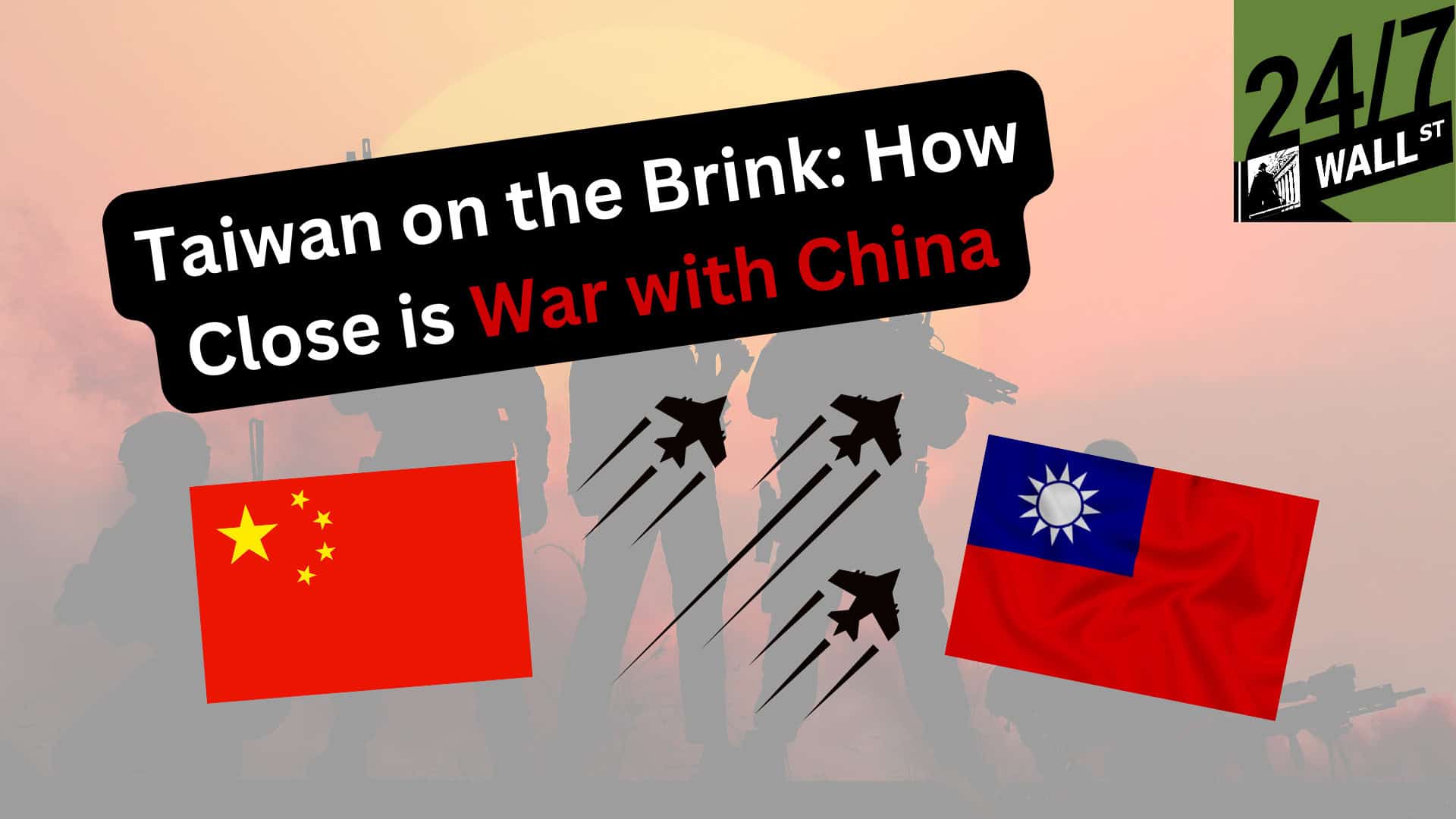
Michael Muir explains the historical and current context of the tensions between China and Taiwan, tracing back to the Chinese Civil War and the fall of the Qing Dynasty. He highlights the symbolic and strategic significance of the 2027-2031 window for potential conflict, noting China's anticipated military capability by then. Muir also discusses Taiwan's defense strategies and the uncertain role of U.S. intervention.
Transcript:So Michael, everyone has been looking at the conflict in Ukraine and trying to project different theories about what happens with Taiwan.And you've done a great job explaining the back context and story for the reason Russia has chosen to invade Ukraine.I'm curious, can you do the same for China and Taiwan now?What is the root of the tensions here?What is going on?And most importantly, what could happen next?I've seen you, I've heard you talk about some really specific dates that we need to keep in mind over the next five to six years regarding this conflict.Please explain to me what is the nature of the tensions here and what could happen next?What do people need to look out for?Sure.Well, whenever we're looking at like a historical explainer of current events, the first question we have to ask is how far back does this go?Because a lot of explanations I've seen start in 1949.And that's kind of the halfway point of the story as far as I'm concerned at its core.The situation between China and Taiwan is a continuation of the Chinese Civil War, which began in the 1920s.Now, the origins of that conflict.So if we go back to the fall of the Qing Dynasty in 1911 to 1912, we have the establishment of the Republic of China.But that was by no means a unified nation.There was a lot of power struggles.But we can get to the 1920s and this was during the warlords era when a lot of China was controlled directly by warlords.And the Nationalist Party and the Communist Party formed an uneasy coalition to take on the warlords.And they retook China, essentially.And what happened at the end of that is the leader of the Nationalists, Chiang Kai-shek, purged all the communists and that basically kicked off the Civil War back in 1927.But at the same time, the Chinese were dealing with Japan's aggression.So they weren't able to fully concentrate on finishing the war.And the communists were very evasive, very difficult, they never actually tried to hold on to any one position, they would keep moving.So it was very difficult to bring that to a conclusion.At the same time, we have the Japanese aggression, the annexation of Manchuria in 1931.And then the invasion beginning in 1936, double check that.But essentially when the war with the second Sino-Japanese war began, the communists and nationalists essentially put their civil war on hold, but that was never going to last beyond that.So when Japan was finally defeated in 1945, essentially the Chinese civil war began again.And the reason the nationalists lost, in the very simplified version of the story, is they made the same mistakes as the Japanese.They spread themselves too thin.They tried to take key cities.In fact, they did take the so-called capital of Japan in communist China, but that didn't really matter because they never made any attempts to hold land.The mobility was their key strength and they would just whittle down the nationalists until the point where the remainder of the nationalist government had to flee to Taiwan in 1948.And that was hardly smooth either, but that's something we can get into a little later.But the point is this was this struggle, it doesn't go back to 1949.In fact, it goes back to the 1920s and it's been going on for about a century.And that's probably one of the reasons why 2027 is such a significant date.This is a century on from the creation of the People's Liberation Army.Continuation of the civil war, which really hasn't ended.This is so fascinating.I mean, and I love the point you make that, you know, the nature of these conflicts sort of depends on where you start history and where you choose to sort of start accounting for rights and wrongs.You know, and we as many people saw with Putin's most recent or the interview that he gave with Tucker Carlson, right?Like you can go back as far as you want to justify the actions.What we're looking at with Taiwan, Taiwan and China, this is not a recent event.This is a war 80 to 100 years in the making.It is.But what's so fascinating about that is that the conflict and tensions may be, let's just say, a century old, and yet it's going to be fought with modern warfare, modern techniques.So what does that look like now?We looked at the past.Now let's look forward.What's happening next?Yeah, well, the Chinese or Beijing, because when we're saying Chinese, we're actually I mean, both sides will say they're Chinese and we have the Republic of China, Taiwan and the People's Republic of China, which we just refer to as China.But the point we're making here is what a conflict would look like.Well, right now, China does not have the capacity to take Taiwan by force.Not yet, anyway.The target date is 2027, which are widely expected to have the ability to do so.That doesn't mean January 1, 2027, Beijing is going to launch an all-out assault on Taiwan.There's still a lot of things that could happen between now and then.And really, the United States should be concentrating on deterring that possibility.And the so-called window of opportunity is generally regarded to be between 2027 and 2031.That's when they're going to have the best, most likely chances of succeeding.Again, it doesn't mean they actually are going to.So Taiwan's defense doctrine is called the porcupine strategy.So if we just imagine a much larger predator sticking its face into the quills of a porcupine, they're not going to want to do that.So what they mean by that is a lot of low-tech, so we are talking about high-tech stuff, but they're also going to have a lot of low-tech weaponry, which is going to afflict massive damage on the army as it attempts to land.There's also a lot of low-tech solutions.I know we're talking, and technology is going to be a major part of this, but we can go back to the geography of Taiwan.The coastal waters are very shallow, which means they can be blocked with very cheap materials.They could just slow them down.Mining in the seas between China and Taiwan is also very possible, very cost-effective.It's not going to stop them, but it could slow them down long enough to have the seasonal window of opportunity pass.But then high-tech gear, Patriot missile launchers, which can be dispersed throughout the island, a major dent, but is it going to be enough to stop munitions?The Chinese, what they've really strengthened is in their A2AD munitions, that's anti-access area denial weaponry.But one of the other points they've gone with with that is to prevent American carriers from intervening.And again, that's the great unknown, as I think we touched upon earlier, is we just don't know how the U.S. is going to respond to this.And I think China wants to have a situation where the U.S. won't respond.And sort of the default stance of U.S. ambiguity is just further complicating that for all sides.But my last question, and you had mentioned, I think, 2027 is sort of a critical timeline to think about.What is it that is important about that timeline and why should we be paying attention?Well, that's going to be when the military buildup is going to reach the point where it's strong enough to carry out the job.And it's also just the symbolic aspect of the century between the establishment of the People's Liberation Army and the 100-year anniversary.And I think the general goal is by 2049 is to have China as the world's foremost superpower.I mean, that's ultimately what they're aiming for.And that's the, you know, one century after the establishment of the People's Republic of China.Got it.Michael, thank you so much for the time today.Thank you for explaining these geopolitical tensions and all of the dynamics at play.
Sponsored: Attention Savvy Investors: Speak to 3 Financial Experts – FREE
Ever wanted an extra set of eyes on an investment you’re considering? Now you can speak with up to 3 financial experts in your area for FREE. By simply clicking here you can begin to match with financial professionals who can help guide you through the financial decisions you’re making. And the best part? The first conversation with them is free.Click here to match with up to 3 financial pros who would be excited to help you make financial decisions.
Thank you for reading! Have some feedback for us?
Contact the 24/7 Wall St. editorial team.



